
Rhodesia, officially from 1970 the Republic of Rhodesia, was an unrecognised state in Southern Africa from 1965 to 1979. During this fourteen-year period, Rhodesia served as the de facto successor state to the British colony of Southern Rhodesia, and in 1980 it became modern day Zimbabwe.

The Selous Scouts was a special forces unit of the Rhodesian Army that operated during the Rhodesian Bush War from 1973 until the reconstitution of the country as Zimbabwe in 1980. It was mainly responsible for infiltrating the black majority population of Rhodesia and collecting intelligence on insurgents so that they could be attacked by regular elements of the security forces. The unit did this by forming small teams that posed as insurgents and usually included captured insurgents. Over time, the Selous Scouts increasingly attacked insurgents themselves and operated in the countries that neighboured Rhodesia.

Air assault is the movement of ground-based military forces by vertical take-off and landing (VTOL) aircraft, such as helicopters, to seize and hold key terrain that has not been fully secured, and to directly engage enemy forces behind enemy lines. In addition to regular infantry training, air-assault units usually receive training in rappelling, fast-roping techniques, and air transportation. Their equipment is sometimes designed or field-modified to allow better transportation and/or carrying within aircraft.

The Angolan War of Independence, known as the Armed Struggle of National Liberation in Angola, was a war of independence fought between the Angolan nationalist forces of the MPLA, UNITA and FNLA, and Portugal. It began as an uprising by Angolans against the Portuguese imposition of forced cultivation of only cotton as a commodity crop. As the resistance spread against colonial authorities, multiple factions developed that struggled for control of Portugal's overseas province of Angola. There were three nationalist movements and also a separatist movement.

The Guinea-Bissau War of Independence, also known as the Bissau-Guinean War of Independence, was an armed independence conflict that took place in Portuguese Guinea from 1963 to 1974. It was fought between Portugal and the African Party for the Independence of Guinea and Cape Verde, an armed independence movement backed by Cuba, the Soviet Union, Yugoslavia and Brazil. The war is commonly referred to as "Portugal's Vietnam" because it was a protracted guerrilla war which had extremely high costs in men and material and which created significant internal political turmoil in Portugal.

The Rhodesian Bush War, also known as the Second Chimurenga as well as the Zimbabwean War of Independence, was a civil conflict from July 1964 to December 1979 in the unrecognised country of Rhodesia.

The Portuguese Colonial War, also known in Portugal as the Overseas War or in the former colonies as the War of Liberation, and also known as the Angolan, Guinea-Bissau and Mozambican War of Independence, was a 13-year-long conflict fought between Portugal's military and the emerging nationalist movements in Portugal's African colonies between 1961 and 1974. The Portuguese regime at the time, the Estado Novo, was overthrown by a military coup in 1974, and the change in government brought the conflict to an end. The war was a decisive ideological struggle in Lusophone Africa, surrounding nations, and mainland Portugal.

The 1st Battalion, Rhodesian Light Infantry (1RLI), commonly The Rhodesian Light Infantry (RLI), was a regiment formed in 1961 at Brady Barracks as a light infantry unit within the army of the Federation of Rhodesia and Nyasaland. Barely a year after its creation, it was relocated to Cranborne Barracks (Salisbury) where its headquarters remained for the rest of its existence. The Regiment became part of the Southern Rhodesian Army when the Federation dissolved at the start of 1964 and, later that year, reformed into a commando battalion.

The Commandos are a commando unit in the Portuguese Army. Presently, their parent unit is the Commando Regiment.
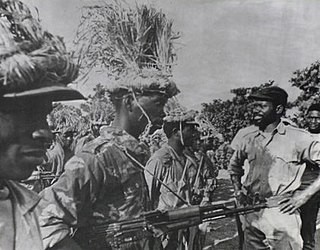
The Mozambican War of Independence was an armed conflict between the guerrilla forces of the Mozambique Liberation Front (FRELIMO) and Portugal. The war officially started on 25 September 1964, and ended with a ceasefire on 8 September 1974, resulting in a negotiated independence in 1975.
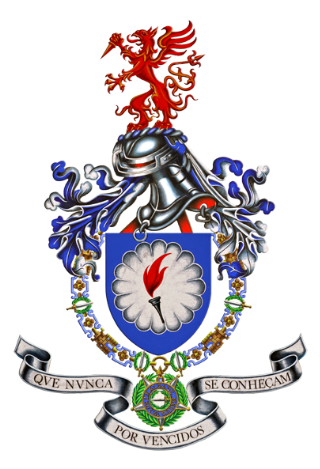
The Regimento de Paraquedistas, based in Tancos, Portugal, is a unit of the Portuguese Army and serves as the instruction center for recruitment and training of the Portuguese paratroopers. This unit includes an entire battalion, acting as support and reserve for airborne units which contains for example, military war dogs and airborne pathfinders and an instruction battalion responsible for the forming of new paratroopers.

The military history of Zimbabwe chronicles a vast time period and complex events from the dawn of history until the present time. It covers invasions of native peoples of Africa, encroachment by Europeans, and civil conflict.
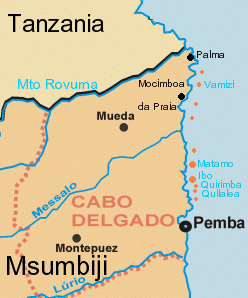
Operation Gordian Knot was the largest and most expensive Portuguese military campaign in the Portuguese overseas province of Mozambique, East Africa. The operation was carried out in 1970, during the Portuguese Colonial War (1961–1974). The objectives of the campaign were to close down the Mozambique Liberation Front (FRELIMO)'s infiltration routes across the Tanzanian border and to destroy permanent FRELIMO bases inside the liberated zones in Northern Mozambique. Gordian Knot was a seven-month long campaign ultimately employing 35,000 men, and was almost successful since it destroyed most guerrilla camps located inside FRELIMO's liberated zones and captured large numbers of rebels and armaments, forcing FRELIMO to retreat from their bases and outposts in the provinces.
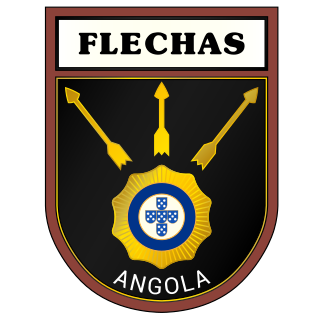
The Flechas were an elite paramilitary tactical unit of the Portuguese secret police that operated in Angola and Mozambique during the Portuguese Colonial War. Unlike most of the other Portuguese special forces that were employed in the several theatres of operations of the conflict, the Flechas were not a de jure military unit but a PIDE/DGS unit.
The Special Groups or GE were commando of platoon size, set up from 1966 to 1974 by the Portuguese Armed Forces in Angola and in Mozambique. Later, Paratrooper Special Groups or GEP were formed, these being units able to conduct airborne operations. By 1974 there were 84 GE and 12 GEP, with 7,700 members, operating in Mozambique and 90 GE, with 3,069 members, operating in Angola.

The 1st Battalion, The Rhodesian Light Infantry, commonly the Rhodesian Light Infantry, was originally formed in 1961 as a regiment of the army of the Federation of Rhodesia and Nyasaland. Raised as a light infantry unit at Brady Barracks, Bulawayo in Southern Rhodesia, the Regiment served in the Rhodesian Bush War as part of the Rhodesian Security Forces between 1964 and 1979, from 1965 under the unrecognised governments of Rhodesia and latterly, during the second half of 1979, Zimbabwe Rhodesia. The RLI remained active during an interim period under British control and then, from April 1980, within the armed forces of Zimbabwe, before disbanding on 31 October 1980.

The 1st Battalion, The Rhodesian Light Infantry, commonly the Rhodesian Light Infantry, served in the Rhodesian Bush War as part of the Rhodesian Security Forces between 1964 and 1979, under the unrecognised government of Rhodesia following its 1965 Unilateral Declaration of Independence from Britain. During the second half of 1979 it fought for Zimbabwe Rhodesia, a black majority-ruled version of the same state which also failed to win international recognition. After an interim period under British control from December 1979 to April 1980, the RLI briefly remained active within the armed forces of Zimbabwe, but did not see action under this government. It disbanded on 31 October 1980.
Operation Uric was a cross-border raid carried out in Mozambique by operatives of the Rhodesian Security Forces during the Rhodesian Bush War, with combat assistance from the South African Air Force. During the operation, which took place from 1 to 7 September 1979, up to 200 Rhodesian and South African military personnel attacked bridges and a major staging point for Zimbabwe African National Liberation Army (ZANLA) insurgents in Gaza Province. Along with Operation Miracle, this was one of the largest Rhodesian external operations of the war.
The 1st Battalion, The Rhodesian Light Infantry, commonly the Rhodesian Light Infantry, served in the Rhodesian Bush War as part of the Rhodesian Security Forces between 1964 and 1979, under the unrecognised government of Rhodesia after its Unilateral Declaration of Independence from Britain on 11 November 1965. Latterly, during the second half of 1979, it fought for Zimbabwe Rhodesia, a reorganised version of Rhodesia under a black majority government which still went unrecognised. After an interim period under British control from December 1979 to April 1980, the RLI briefly remained active within the armed forces of the internationally recognised Republic of Zimbabwe, but did not see action under this government. It laid up its colours on 17 October 1980 and disbanded two weeks later.
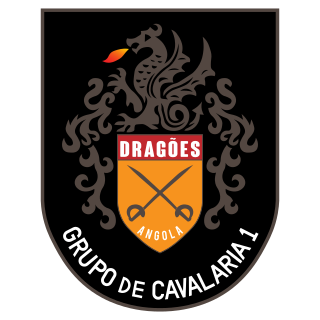
The 1st Cavalry Group, until 1968 the Reconnaissance Group of Angola, and commonly known as the Dragoons of Angola, was an elite cavalry (horseborne) unit of the Portuguese Army, that operated in the Angolan War of Independence against the communist guerrillas. The unit started to be raised in 1966 and was disbanded in 1975 due to the events of the Carnation Revolution in Lisbon, the end of the Portuguese Colonial War and the independence of Angola. In military history, it was probably one of the last units of real dragoons to be used in combat operations, excluding the Rhodesian Grey's Scouts.
















